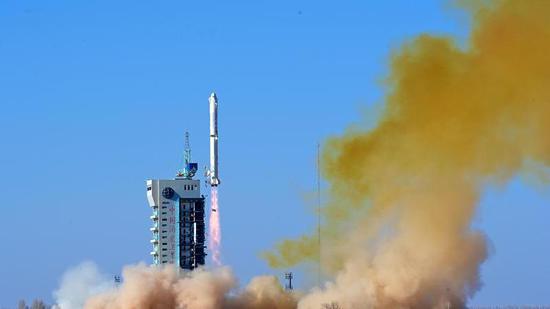China's space exploration has been helping unlock a deeper understanding of the universe, from Earth to the moon; from Mars to the infinite universe.
FROM EARTH TO MOON
With multiple satellites launched, China has largely completed its High-resolution Earth Observation System, providing land observation services. The country can also view waters around the globe on all scales and observe the global atmosphere to boost disaster response capability.
China's success of the Chang'e-5 mission marked the conclusion of a three-step lunar exploration program that consisted of orbiting, landing on the moon, and returning with samples.
The Chang'e-5 mission was China's most complicated systemic space project that required the most diversified technologies. On Dec. 17, 2020, the return capsule of the Chang'e-5 probe brought back the country's first samples from an extraterrestrial body.
Last July, the China National Space Administration released the online database of the second batch of lunar samples brought back by the Chang'e-5 probe. Researchers and the public can access the Lunar and Deep Space Exploration Scientific Data and Sample Release System via the website www.clep.org.cn, where they can apply for data and samples. The first batch of the lunar samples, about 17 grams, was delivered to 13 institutions in the same month.
The analysis of the data sent back by Chang'e-5 lander is also yielding results. A study published last month showed that the moon had turned drier within a certain period, probably due to its mantle reservoir's degassing. The findings provide more clues for future lunar missions as crewed lunar stations are in the pipeline in the following decades.
FROM MARS TO INFINITY
Last May, China landed its Mars probe, Tianwen-1, on the red planet, ushering in a new chapter of China's deep space exploration and marking another contribution to humanity's exploration of the universe.
The Mars rover Zhurong has traveled more than 1,200 meters on the planet and is currently heading toward a region that might have been the coastline of an ancient ocean, looking for clues about Mars' evolution.
China's first solar exploration satellite, launched into space last October, is sending data on solar flares back to Earth. It can deepen our understanding of the sun.
Shrinivas R. (Shri) Kulkarni, George Ellery Hale Professor of Astronomy and Planetary Science at California Institute of Technology, told Xinhua in an interview last year that the universe is much stranger than people think. However, building astronomy telescopes is very expensive and no country can do astronomy all by itself.
He noted that China's telescopes like FAST and HXMT had become driving engines for discoveries.
Last March, China announced that its Five-hundred-meter Aperture Spherical Radio Telescope, or FAST, could be accessed by astronomers worldwide.
Located in a naturally deep and round karst depression in southwest China's Guizhou Province, FAST started formal operation in January 2020. It is the world's most sensitive radio telescope. With FAST, scientists have identified over 500 new pulsars.
In 2017, China launched a space telescope, the Hard X-ray Modulation Telescope (HXMT), or Insight, to observe black holes, neutron stars, gamma-ray bursts, and other celestial phenomena.
In 2020, scientists, using HXMT, discovered the strongest magnetic field ever observed in the universe, on the surface of a neutron star named GRO J1008-57.
Last year, an international team of researchers reported that a fast radio burst detected by HXMT came from a magnetar in the Milky Way, marking a milestone in understanding the nature of the mysterious signal emanating from the universe.
In 2015, China launched its first dark matter probe satellite Wukong. It has finished the full-sky scan 11 times and collected about 10.7 billion cases of high-energy cosmic rays, obtaining the most accurate measurement results of cosmic-ray electrons, protons, and helium nuclei above the trillion electron volts energy region.
In 2021, China started to build its space station, opening a new foothold for humanity in space. This year, multiple missions have been planned to complete the construction, including launching two lab modules.
China's space station, guided by the idea of building a community with a shared future for humanity, will become a common home transcending Earthly bonds and an outpost for countries worldwide to explore the universe through cooperation.

2026 Zhongguancun Forum to be held in late March
The 2026 Zhongguancun Forum (ZGC Forum) is scheduled to be held in Beijing from March 25 to 29, according to i...(4440)人阅读时间:2026-02-26China's Xuelong wraps up ocean mission in 42nd Antarctic expedition
China's research icebreaker Xuelong left Antarctica's Terra Nova Bay in the Ross Sea on Saturday after...(4816)人阅读时间:2026-02-22
Philippine VP Sara Duterte announces 2028 presidential bid
Philippine Vice President Sara Duterte announced on Wednesday that she will bid for the presidency in 2028.&nb...(5119)人阅读时间:2026-02-18
Chinese authorities launch investigation after fishing boat hits Bryde's whale
(ECNS) - A fishing boat has collided with a Bryde's whale near Weizhou Island in southern China&...(5316)人阅读时间:2026-02-13
Over 630 buildings in Myanmar's Myawaddy KK Park demolished
(ECNS) -- More than 630 buildings in the KK Park complex in Myawaddy Township, Myanmar, have been demolis...(5547)人阅读时间:2026-02-09
2026 Zhongguancun Forum to be held in late March
China's Xuelong wraps up ocean mission in 42nd Antarctic expedition

Philippine VP Sara Duterte announces 2028 presidential bid

Chinese authorities launch investigation after fishing boat hits Bryde's whale

Over 630 buildings in Myanmar's Myawaddy KK Park demolished

China, Algeria expand space cooperation with new satellite launch

Chinese PLA aerobatic team to fly J-10 Jets at Singapore Airshow

Free entry for Chinese fans at AFC U23 Asian Cup final a rumor

2026 Zhongguancun Forum to be held in late March
China's Xuelong wraps up ocean mission in 42nd Antarctic expedition

Philippine VP Sara Duterte announces 2028 presidential bid

Chinese authorities launch investigation after fishing boat hits Bryde's whale

Over 630 buildings in Myanmar's Myawaddy KK Park demolished

China, Algeria expand space cooperation with new satellite launch

Chinese PLA aerobatic team to fly J-10 Jets at Singapore Airshow

Free entry for Chinese fans at AFC U23 Asian Cup final a rumor